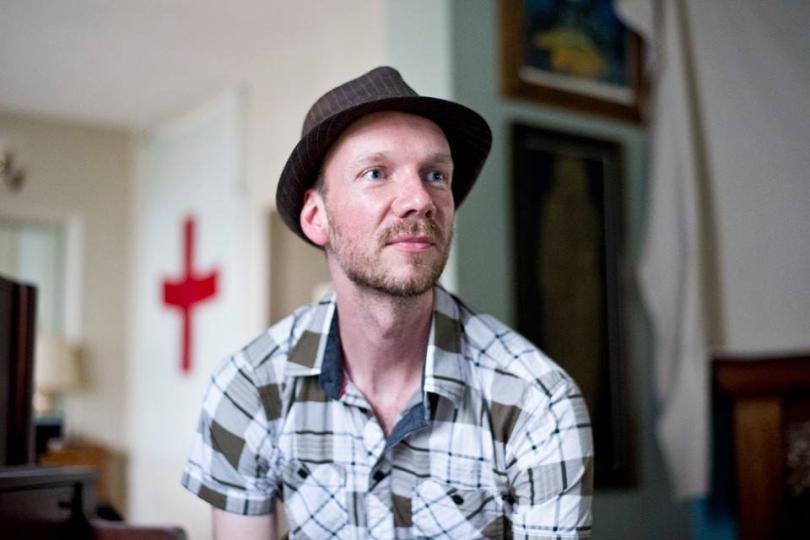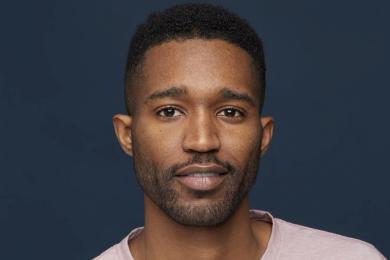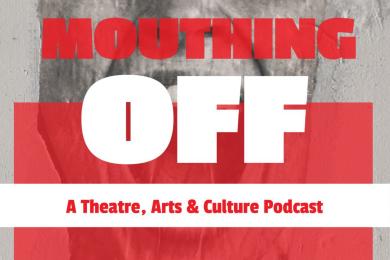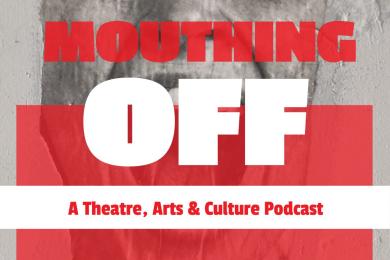Project, people or money

And I am back Twin Cities! Highlighting another artist and their hustle to show you all that “YES! We can make it in this world”. This story is highlighting the talented Peter Morrow. Maybe you’ve never seen Peter but chances are you have seen his work. Peter is a beloved sound designer here in our very own community and has worked all over town bringing shows to life. We recently worked together at Park Square Theatre where he designed mysterious and haunting sounds for Ken Ludwig’s Baskerville: A Sherlock Holmes Mystery (Directed by Theo Langason, A hustle Story Alum). We sat together at a Starbougie in South Minneapolis. We were both in between summer gigs working with youth, so as you can imagine, we were so full of energy and exuberance!! . . . . Wait maybe that was the coffee
First of all, can you just talk about yourself? Like anything, talk about yourself! Hi how are you how was your day?? What do you like to do outside of the theatre?? (Whoa I think that was the coffee talking)
My day has been great! Well part of the things I like to do has to do with my work in the theatre. I used to work in I.T. and my undergraduate was in business and technology so I had a whole past career that I tried but I learned a lot of skills that have helped me transfer to becoming a self-employed person in the arts.
How long did you work in I.T?
About 5 years, my undergraduate was management science and information systems which isn’t that exciting. And then I worked for a company in St Louis for four and a half years doing a range of things from programming to management.
When did you decide that that’s not what you wanted to do? Or “why” is maybe the more appropriate question?
I found that I was more of a workaholic than I knew and if I was going to work so much then it needed to be something that a) I was gonna enjoy and b) is more important than making money for a large corporation. And I’ve always dreamed about making money doing music. I worked off and on part time as a musician. In highschool I was in band and in college I played in a band and recorded. But once work started I didn’t have time for it because I worked so much.
Did you work over time?
I wasn’t paid hourly so full time was way overtime and I did three years where I probably averaged 70 hours a week! And I got to this point where I was like “ I wanna try this other thing”. And I was looking into a masters in Dublin so I went back to Dublin and did a Masters in Media Technology focused on composition and audio technology.
And you’re from Dublin. A lot of readers won’t know that but I KNOW THAT BECAUSE I KNOW YOU!! (The coffee again. . . yeesh Ashawnti!). When did you move to the United States?
I moved to the Twin Cities from Dublin six years ago. I grew up in Dublin and after highschool I spent nine months in Seattle and then I went to college in Dublin then St. Louis for four and a half years then back in Dublin for eight or nine and then came here. You can determine my age from that probably! (We laugh, he’s a funny guy!).
Well, what in your head made you decide Minneapolis? How did you find Minneapolis on the map? What even brought you here?
A woman. I knew nothing about this place. I knew three people through my now ex-wife and I very quickly had to find my feet on my own because it didn’t work out with marriage. I got taken in By New Native Theatre and Bedlam; who became my family. They helped me through that by working and partly through Karaoke Therapy! I didn’t know it was a thing but it really is!
My first show with them was one that Rhiana wrote.
RIHANNA WROTE IT???
Rhiana Yazzie! She’s the artistic Director of New Native Theatre
(Oh, I knew that! Shoutout New Native Theatre).
And so they all just took you in and helped you?
Yea
Do you find that a lot in Minneapolis as compared to other places? Even though you didn’t do theatre those places?
Well I worked a corporate job in St. Louis but I think there is a lot more community in what I do here. In St. Louis I see people I work with at work and that’s it, you go home. I had friends but it was different. I feel like my experience is different than many people I’ve spoken too who feel like they come and have a really hard time finding community. Community is what kept me here within my first month. I felt taken in enough that I didn’t need to go home.
What is your specific work in the theatre?
I’m a composer, sound designer and teaching artist. Those are the three primary things of what I do.
And what are the differences between a composer and sound designer?
A composer writes music. There are sound designers that compose but you don’t have to be a composer to be a sound designer. You can source and create and manipulate sounds. I write for instruments as well, if I want a piece of cello I can write some notes score it out hand it to a cellist and say “play this”!
And as a teaching artists what do you do?
I work for about five organizations doing many different things (Children’s Theatre, Bridges, Stages, Stepping Stone). I do workshops for technical theatre, set design modules sound design modules, things like that. We create sounds and talk about what sound design is and I send them off to create things!
A lot of the times I feel like youth get to theatre camps and the programs are geared for the performance aspect. Why do you think it’s important to have the element of people learning sound, music, lights and all the backstage stuff?
I think it opens up working in the arts and areas students are interested in. They are drawn to movies and TV and performance but don’t necessarily have the drive to perform. It opens up the range of work where their interest in certain skills are drawn in other areas. To have an environment where that is explored gives more students the opportunity to explore those areas. Right now I am working with students who have autism, the camp is about relationship building and there is room for performers to perform and those who want to do things like draw - they get to design the background of the scenes, props. There is one student who never wanted to set foot on stage and we all wondered “how are we gonna get him hooked”. We saw that he was fixated on the names of locations and so we created a space for him, every transition he gets to create anagrams of the names! So scene one is “Murry House” he will put up “Hurry Mouse” and then shift it to the right name. So we got to encourage his interests.
I like how you said “it opens up another world of how you can be a part of this work”, when did you know you wanted to work in the theatre?
I don’t think I knew I wanted to work in the theatre until I got hired to do a theatre job in Dublin. Because I went to college for composing and audio tech I ended up with these skill sets that are sound designing skill sets. I didn’t even know the term sound designer. I ended up working for the Dublin Arts Festival and got asked to work with Dublin New Theatre and I got sucked in and loved it! And worked with that company for six years!
So you were never interested in theatre until then?
I don’t know if I would say that. There was no theatre department at my school but had there been I bet I would of dabbled in it.
So after working with New Native and Bedlam, was it hard finding other work? How did you find work or how did work come to you?
After that project there were things that came my way. I ended up filling in for someone at Mixed Blood doing board-opp and between those two jobs I barely had to look for work after that. What I found in this community that once you work with someone and they like your work and enjoy you as a person your name just gets added to a list that gets passed around! I think, particularly in the design front, there’s a shortage of people. So if you find someone you like, people don’t keep names to themselves. All of a sudden you get calls and emails.
Do you go through any type of interviewing process? How do designers get jobs??
I would say it’s almost entirely word of mouth!
There is a shortage! I would say on all the shows I’ve done I usually have some of the same designers. That’s good for you!
What has become a part of the game is finding those organizations that you want to continue having work with. And if you can’t make it work, you create a little network of people you have seen work and maybe make space for people who are younger and just starting out. Ideally who are not white men like me! In my area, sound design, there are a couple of white women working but it’s almost entirely white men.
Do you know any sound designers of color? Or have you worked with any people of color in tech?
I have worked with one sound designer of color. There are some up and coming people that maybe fall into another area but could totally do sound design. More audio engineer people.
When you work with youth, do you see any youth of color drawn to backstage work?
Depends on where I am working (we laugh). But a lot of places I am working we have talked about how to foster that. And you're right, a lot of programs are heavily performance based. But those organizations that have the budget to bring in sound designers, like high schools, typically are suburban and white.
There are a few reasons why those interested in tech are mostly white; it’s almost impossible to sustain yourself starting out and if you don’t have support structures to support you making nothing for a period of time then it will be hard to do it. The nature of that means that people more well-off can sustain it and based on demographics those people are white.
I also think it’s about representation too!
Yea and so it becomes a cycle because people can’t sustain and then people aren’t represented.
So as we are talking about sustaining, have you ever thought about just going back to your corporate job?
At least once a year! The amount of hours to keep your head above water is nuts! I work all the time. And sometimes it just builds up and I’m like “there’s gotta be an easier way”. And then there are those projects that were just not worth the time. I’m working enough now where I get to choose projects that my heart is in it too. I think about “project, people or money” and if you can get two out of those three then it's worth it. There are projects you’ll do for money and projects you’ll do for people. It’s about trying to find enough of those that can sustain you in positive ways.
Are there any career moments you'd like to do over for any reason?
There are jobs that in retrospect I would not have taken. I don’t know if I’m gonna name them for this article (LOL DANG IT! THE JUICY STUFF).
What lessons have you learned from that?
I feel like where I stand in the community now as an artist it’s much easier for me to say no to things for a variety of reasons. Because the first couple of years I felt like I didn't know what I was doing, I didn’t feel like I had a place. I feel pretty secure now that I don’t need to search for work. But the first few years whatever I was asked to do I did and there were situations where I worked and I did not feel comfortable. Not for financial reasons but in the way things were dealt with and I didn’t feel strong enough to say “you can’t do this or I’m walking” whereas now I feel like I can do that and be fine. Some of that is just maturity and confidence.
So, you had a studio that got burned down. How did you feel when you heard that had happened?
Well I watched it! I went down there and just watched with some of the other folks from the community. For the first couple of days there were thoughts about going back to a corporate job. I couldn’t afford to replace the equipment, how am I gonna fund getting this stuff back to do the work that I need to do. Segments of what I do were not in there but my music and sound creation stuff gathered over years and years.
Did you know that the community would come through and help you? Someone started a gofundme for you!
It took awhile for me to let the gofundme happen but I was surprised. I knew the community would help in ways like letting me borrow equipment, a lot of that happens already. People share what they have. Companies are great, from the Guthrie right down to the smallest organization.
And you got over your goal in like less than a week!
I wanna say we reached the goal of 10k in like four days!
I thought that was really beautiful. It’s because we need you! I just wanna know from you, what is some advice you may have for someone who is just starting out?
I would advise them to ask for help. If you are interested in lighting our sound design and you see a show where the lights or sound is really beautiful? Contact those people to see if you can shadow, intern. Don’t be scared to ask anyone. I think there is often a fear to talk to and ask for support from people you put on a pedestal. Don’t be (scared)! Ask! Get stuck in and show up.




